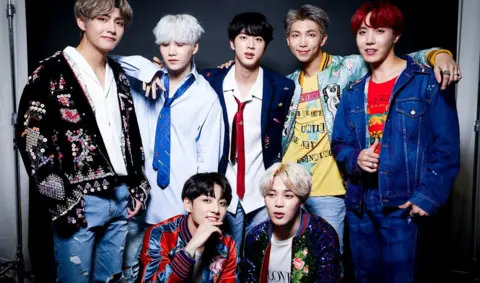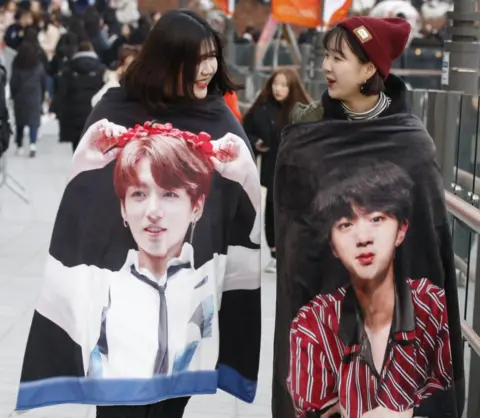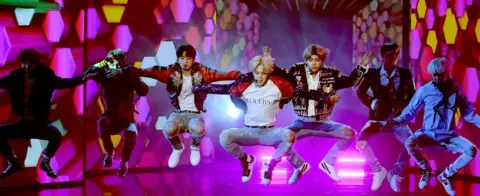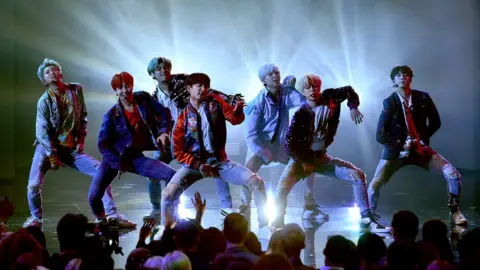BTS: The enduring power of the princes of K-pop
 Getty Images
Getty ImagesK-pop has been the driving force of Korean popular culture for more than two decades and one band is now leading the way. But, as the BBC's Heather Chen and BBC Korean's Minji Lee write, can BTS keep up their extraordinary rise in 2018?
It's big business across Asia, contributing billions of dollars annually to the South Korean economy, but has yet to make a significant impact on Western markets. While pop star Psy found massive chart success with his 2012 dance hit Gangnam Style, his star soon fizzled.
But come 2017 and enter BTS, the seven-piece boyband who last year managed to go where no K-pop act had gone before by conquering a notoriously difficult and unforgiving market: the US.
A highly successful US tour propelled their musical combination of pop, hip-hop and R&B - mostly in Korean - on to the global stage.
They had the highest charting album ever by a K-pop act on the Billboard 200 charts and in November, became the first K-pop act to top the US iTunes chart.
Add that to their Billboard Music Award win in May, where fans voted them Top Social Artist, beating the likes of Justin Bieber.
The boys wrapped up a milestone year by making social media history too.
On Twitter, they received several honours which included "most engagements for a music act" and their very own emoji, and they were named the year's most retweeted artist.
How does the band connect to its fans?
That's appropriate for a band whose success has been driven by their meticulously maintained social media presence, winning them fiercely devoted fans who call themselves the ARMY.
Allow Instagram content?
"We can tell you what outfits they were wearing at a particular shoot or which is their favourite Animoji," says 19-year-old university freshman Angelica Bacani from the Philippines.
"Sometimes on my way to school, I scroll through my feeds and see messages from the boys which always cheer me up."
The self-professed diehard fan, whose favourite member is Jin, told BBC News that it was the "personal connection" with the band, provided by social media, that fans enjoyed most.
"Other bands come across as being distant and untouchable but BTS are so relatable."
 EPA
EPAAccording to Seoul-based pop culture critic Kim Hern-sik, this "genuine and down-to-earth" social media behaviour "wasn't something that was crafted but them just being themselves".
"K-pop groups nurtured by bigger talent agencies often run massive marketing promotions with the aim of transforming singers into idols," Mr Kim told BBC News.
"They are systemic and controlling so fan interaction becomes restricted. The style of communication therefore comes across as being too formal.
"However this isn't the case of BTS, who are managed by a relatively small agency. The boys are granted freedom in interacting with their fans on social media and are not treated as just being part of a huge system but rather, like actual human beings."
Who are BTS?
 Getty Images
Getty Images- Founded by Big Hit Entertainment, the band of seven made their debut in 2013. They are: Jin, Suga, J-Hope, RM, Jimin, V and Jungkook
- Their acronym originally stood for Bulletproof Boy Scouts but when they began targeting the US they said it meant Beyond the Scene
- Critics say what sets BTS apart from other K-pop bands is their daring approach in covering "taboo" subjects like bullying, elitism and mental health
- Their performances mix pop, R&B, hip hop and tightly choreographed dance routines
- Hits include DNA (performed at the 2017 AMAs), poignant youth anthem Blood Sweat & Tears, and Spring Day, which many fans view as a tribute to the 2014 Sewol ferry disaster. The band also collaborated with American DJ Steve Aoki for the song Mic Drop
Read more: Who are BTS and why are they so important?
Another good year ahead?
Yes, according to Mr Kim, because they are still offering something new.
"BTS is different from Psy who had one good song but didn't maintain a consistent style afterwards," said Kim Hern-sik. "BTS consistently and continuously built up a musical identity that really resonates with teens."
He says they transformed the way that Korean celebrities - previously seen as perfect and far-removed from ordinary life - should be networking in order to build loyal fan bases.
"Ultimately, they are really successful because they know how to interact with their fans and I think their popularity is here to stay."
 Getty Images
Getty ImagesBusiness observers like Singapore-based branding strategist Martin Roll agree.
He says the "hallyu wave" - the explosion of Korean popular culture - "has proven to be a blessing for Korea and is definitely here to stay".
"The past decades are evidence that K-pop is no longer just a passing fad, but BTS needs to constantly think of novel ways to engage their fans in order to sustain their position at the top of the Korean entertainment industry," he told the BBC.
Allow X content?
The boys are in for a busy year ahead. They are signed on as coveted tourism ambassadors, debuting a year-end ad which caused the Seoul city government's tourism website to crash.
"The 'idol power' [around BTS] is really on another level," remarked Peter Kim, an official at the tourism business division. "The strength of the reaction to this video was unprecedented and we did not expect it to be so popular so it definitely went further than what we expected!"
BBC News in Seoul contacted representatives from Big Hit Entertainment for this feature but were declined a media interview.
